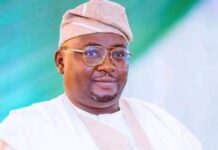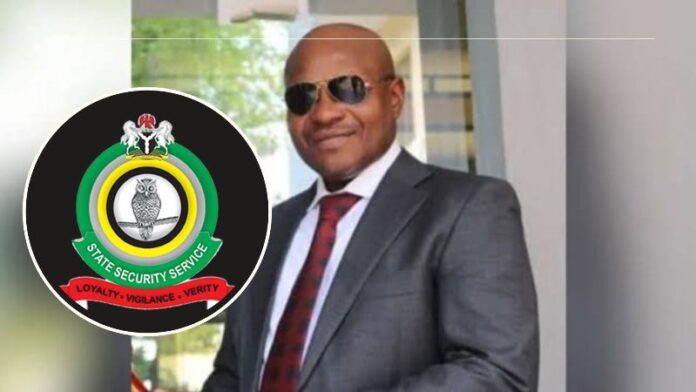Sonala Olumhense
In August 2024, Adeola Oluwatosin Ajayi, a stalwart of Nigeria’s intelligence community, became the new Director-General of the Department of State Service.
Six months after his arrival, Ajayi is proposing new thinking about Nigeria that suggests the collapse of the government’s traditional security architecture and its responsibility for fixing its growing insecurity.
According to the DSS chief, communities—not the country’s security agencies—should now become the nation’s first line of defence in tackling the current issues.
He made the proposal in mid-February in Abuja in the presence of various current and former security chiefs, including the National Security Adviser, Nuhu Ribadu, and the Chief of Defence Staff, Christopher Musa, none of whom objected to the smug idea.
“You do not expect the Nigerian Army, police, and SSS to protect every Nigerian,” he said. “It is not going to work.”
We do expect the security agencies to do their work. That is what the constitution provides, affirming that “the security and welfare of the people shall be the primary purpose of government.” Not a secondary purpose, but the “primary.”
This means that the security of the people is the first order of business for the government of the federation, which is the level of governance that has—and controls—the security agencies.
Ajayi cited examples of communities in Nigeria that have been recorded for combating and defeating attacks, trying to frame them as a template for Nigeria if it is to defeat insecurity.
It is a weak argument. Nigerian communities have always defended themselves, and they still do, despite the imbalance in modern firepower, where they find themselves holding sticks and cutlasses against the handguns and assault rifles routinely deployed against them by kidnappers, terrorists, or even security agents.
It is the responsibility of the state to protect its citizens, a duty the government assumes when it takes the oath of office. The problem is that in Nigeria, after the government has been sworn in, the love of luxury and the sense of power often take precedence over a sense of obligation.
Let us not forget that the APC was voted into power in 2015 principally because of the insecurity in Nigeria, with Muhammadu Buhari vowing to use his military prowess to address it.
This means that between him and his successor, President Bola Tinubu, the APC has now spent 10 years in power, sadly making Nigeria even more insecure.
Buhari, remember, spent a significant amount of time in a London hospital while insecurity blossomed. Tinubu has now assumed that template, repeatedly flying into France on a variety of visits, wallowing in incompetence or manufacturing philosophies to avoid their responsibilities, or making citizens assume roles that the law has mandated and empowered official structures to accomplish.
“Our culture is communal,” Ajayi said in his convoluted first-line-of-defence proposal.
“Why can’t we fight miscreants, charlatans, together?”
I did not know that powerful, violent and well-organised terrorist groups were “miscreants.”
The DSS boss went on: “The elites should discuss with their communities, come to us, get some sort of approval and guidance, and then we can stop these miscreants…security starts from you…”
What is, “Come to us…get some sort of approval and guidance”? Who are “us”? How do Nigerian communities “come to us”?
And what in the world is “some sort of approval?” Does Nigerian law say that DSS can arm villages and communities with broomsticks and cudgels to combat herdsmen who are armed with assault weapons and GPS systems.
By what roads will villagers travel from the four corners of Nigeria into DSS Headquarters, the Lagos-Kano rail?
The Ajayis of the Tinubu administration forget something else beyond the constitution: the APC 419-ed its way into power by swearing that it would end Nigeria’s insecurity.
Here, from the website of the electoral commission, is the 2015 APC Manifesto, in which it pompously advocated “APC’s commonsense solutions.”
Among others, the party promised to:
Employ at least an extra 100,000 police officers and establish a properly trained and equipped Federal Anti-Terrorism Multi-Agency Task Force to destroy Boko Haram and any form of insurgency;
Introduce an immediate pay rise and improved conditions for all five security services.
Address the underlying problems of unemployment, poverty, and social injustice that caused the insurgency through a Comprehensive Economic Development Programme for affected states and communities.
The APC lamented: “60% of Nigerians live in poverty, just 3% have healthcare coverage, while barely half of our children transfer from primary to secondary school. Our roads and rail systems are in disrepair. Less than 35% of our people have access to electricity, and those that do are subject to running blackouts and chronic power shortages…”
And then it said, “The Nigerian people need relief; relief from mismanagement, relief from the grinding poverty many of us face; relief from a failing Nigeria. An APC government will provide this relief.”
Relief? Ten years later, the APC only made things worse, creating layers of luxury and indolence for the leadership circles and their families.
All of this occurred as the economy plummeted, the naira collapsed, big companies fled, the national grid fluttered, unemployment soared, and Nigerians emptied into countries such as Niger, Cameroon, and Ghana. Powerful Nigerians routinely send their families abroad.
Instead of security, we have amassed an Air Force arsenal which bombs civilians while the terrorists grow stronger as the National Security Adviser praises phantom “Tinubu Gains.”
In January 2024, the Nigerian military announced that it had deployed its special forces across the country in a renewed onslaught on insurgency, kidnapping and other security threats.
In January 2025, Chief of Air Staff Hassan Abubakar also announced that the Air Force flew 15,915 flying hours in 18 months. So why is Nigeria increasingly insecure?
The problem is in the insincerity of Nigeria’s leadership class, which is why Nigeria is stuck in place. That Tinubu went on a personal vacation to France last week as the tragedy in Uromi happened and US tariffs loomed, are reminders that he sees no urgency in our condition.
And so, Nigeria is on autopilot, our disasters of insecurity, poor infrastructure and a dwindling economy being normalised by a government which thinks that starving and barely surviving citizens should do their work.
But it is not the ordinary citizen who enjoys the statutory authority, like Ajayi, to deploy in 36 states and 774 local governments. It is Ajayi’s DSS that is complicit if it cannot identify and throttle terrorist gangs that have no airport, seaport, or diplomatic structures but replenish their arms supplies at will.
How, DSS, are armed herdsmen able to travel to far-flung communities and farms around the country, committing unchallenged mayhem?
Why, DSS, are the security agencies enjoying all the power, the glory, the weapons, and the money, while it is starving citizens who must take up arms?
In our age of dazzling technological leaps, why is DSS hiding in Abuja, supplying protection and house-help services to politicians while Nigeria burns?
Maybe citizens should defend themselves, but that would render DSS a meaningless luxury. In which case, it should first be shut down.

































































